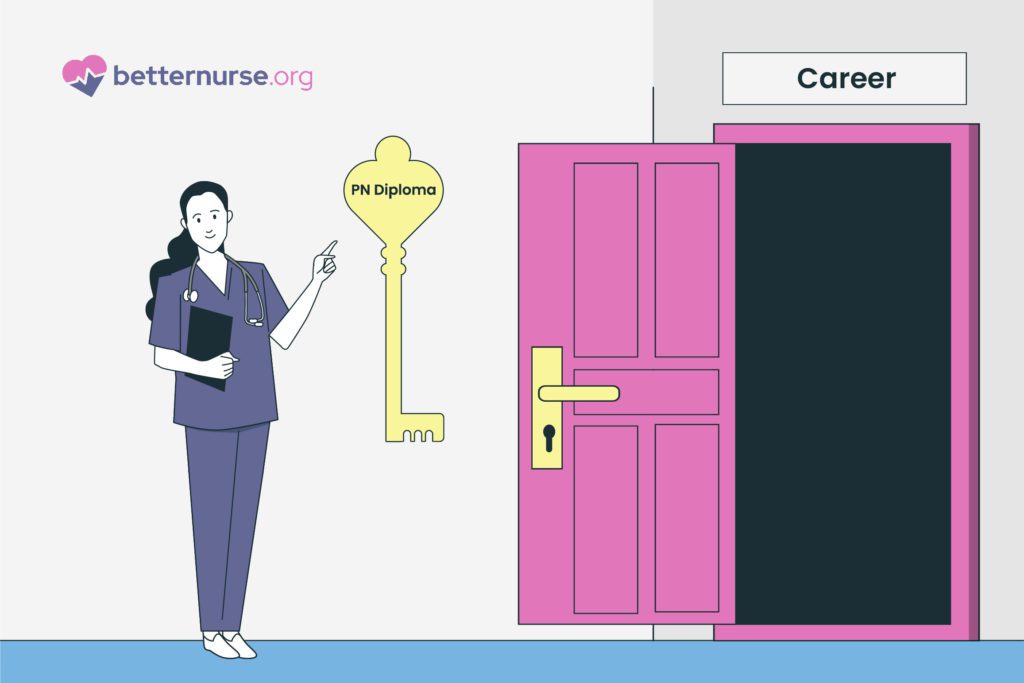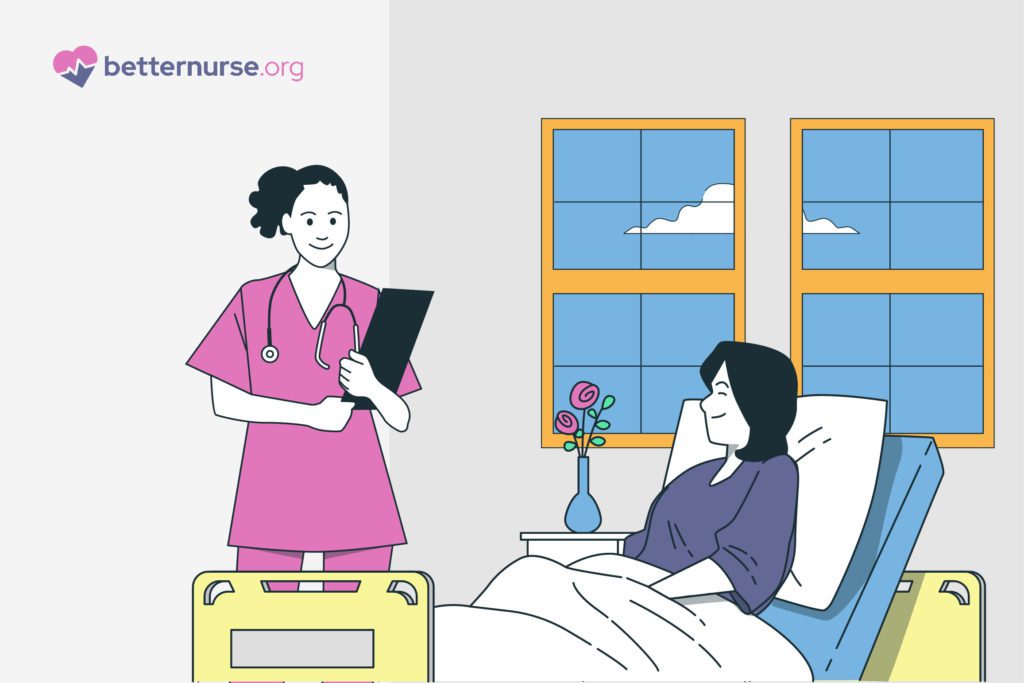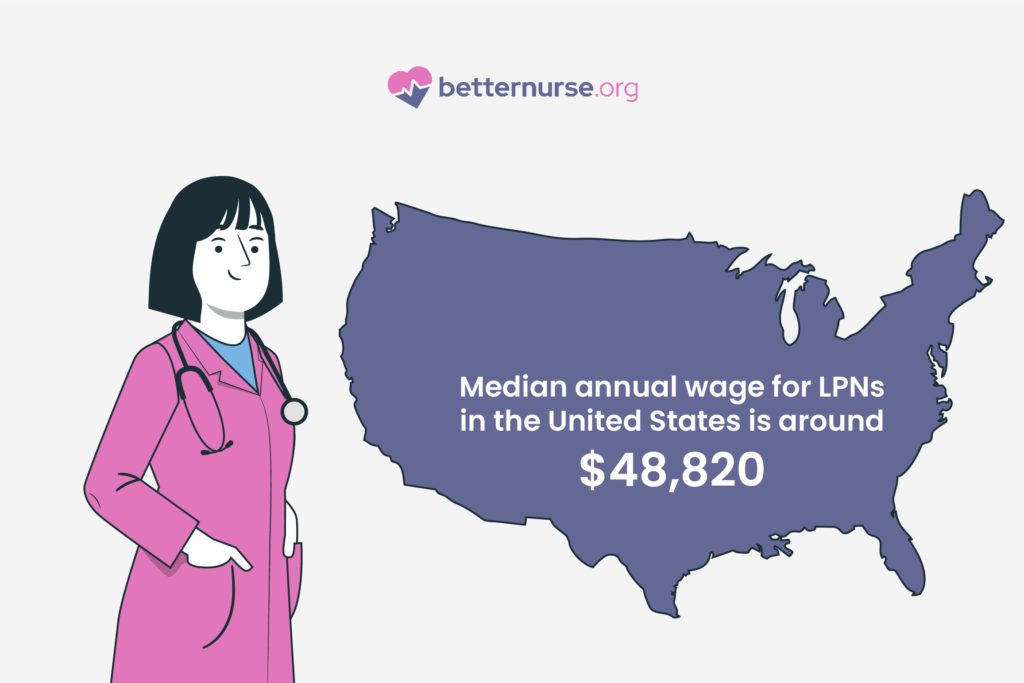A licensed practical nurse degree, or PN degree, is a program typically offered at community colleges and vocational schools that prepares students for a career as licensed practical nurses. The program includes classroom instruction and hands-on clinical experience.
Understanding a Licensed Practical Nurse Degree
If you’re considering a career in nursing, this guide will provide you with a comprehensive overview of what a PN degree is, what it entails, and how it paves the way for a successful career as a licensed practical nurse. From the educational requirements to the job outlook and salary expectations, this guide will cover everything you need to know about pursuing a PN degree. Let’s dive in and explore the world of licensed practical nursing together!
Takeaway
A licensed practical nurse degree (PN) is like a foundation for a house. Just as a solid foundation provides stability and support for a house, the PN degree offers a strong educational foundation for a career in nursing.

What Does a Licensed Practical Nurse Do?
Licensed Practical Nurses (LPNs) have an essential role in providing compassionate and quality care to patients and often serve as the direct contact for patients and their families.
They are responsible for providing immediate nursing care to patients under the supervision of registered nurses (RNs) and doctors. They work in various healthcare settings, such as hospitals, nursing homes, clinics, and private homes. Some of their main job duties include:
- Recording patients’ vital signs, such as blood pressure, pulse, and temperature.
- Administering medications and treatments prescribed by doctors and RNs.
- Assisting patients with daily activities, such as showering, dressing, and eating.
- Collecting and analyzing lab samples and other specimens.
- Monitoring and reporting changes in patient’s conditions to RNs and doctors.
- Maintaining accurate and up-to-date medical records.
How Do You Become a Licensed Practical Nurse?

Becoming a licensed practical nurse requires dedication and hard work. Still, it is also a rewarding career choice if you are passionate about helping others and positively impacting the healthcare field. To start working as an LPN, you must follow the steps below.
Prerequisites
The prerequisites for becoming an LPN vary by state and program, but generally, all include certain requirements. Applicants to an LPN program must typically be at least 18 years old and have a high school diploma or equivalent. They must also submit a completed application and transcripts and pay an application fee.
Additionally, before you are accepted into an LPN program, they will require a criminal background check, health evaluation, and proof of citizenship or legal residency. Some programs may also mandate the completion of prerequisite courses and interviews with program directors.
Those seeking to enroll in an LPN program should research the specific prerequisites for the program they wish to attend and confirm licensing requirements with their state’s nursing board.
Education requirements: diploma or degree
The education requirements for becoming a licensed practical nurse involve completing a diploma or degree program from a state-approved nursing school. LPN programs take around one year to complete and cover patient care, pharmacology, and anatomy topics. Some LPN programs may also offer a two-year associate degree option, providing additional nursing theory and community health coursework.
If you wish to advance your career and pursue a Bachelor of Science in Nursing (BSN) degree, you must finish an additional two to three years of study. However, always research your state’s specific education requirements for LPNs and consult the appropriate state licensing board for additional information.
NCLEX-PN exam
Passing the NCLEX-PN is a critical step towards achieving licensure as an LPN and pursuing a rewarding career in nursing. The NCLEX-PN is a standardized exam that measures the knowledge and skills necessary to perform safely and effectively as an entry-level practical nurse. The computer-based exam consists of multiple-choice questions that assess various aspects of nursing practice, including patient care, health promotion, and infection control.
You must register with your state’s board of nursing to take the NCLEX-PN and complete the exam within a certain timeframe after graduation from an approved LPN program. Adequate preparation is essential to passing the NCLEX-PN. You are advised to utilize study guides, practice exams, and other resources to help them succeed.
Start working!
After fulfilling all the requirements to become a licensed practical nurse, it’s time to commence your career in the nursing field. As an LPN, you will work in a diverse range of healthcare environments, including hospitals and nursing homes, and positively impact the lives of countless patients.
A dynamic field like nursing will offer you plenty of opportunities to grow and advance professionally. So, prepare to apply your expertise and skills to make a meaningful difference in the lives of others. A bright future awaits you on your path to a fulfilling and exhilarating career!
3 Top LPN Programs and Schools
Santa Barbara Community College
Santa Barbara Community College offers a vocational nursing program that spans over three semesters on a full-time basis, leading to licensure in California, the highest-paying state for licensed practical nurses. The program starts admitting new students every 18 months, and graduates can further their studies in an associate of science program in vocational nursing. The best part is that the tuition rate for all students remains the same, regardless of their residency status.
Edmons College
Edmonds College, located in Lynnwood, Washington, provides the local community with various programs, including the practical nursing program, which takes 21 months to complete.
The year starts during the fall quarter. Courses use a hybrid format, which means students have some theory courses online but then earn practical experience in person. To qualify for the program, you must have a 2.75 GPA on your high school transcripts and pass the Test of Essential Academic Skills (TEAS) offered through Edmonds College.
Florida Gateway College
Located in Lake City, Florida Gateway College provides various nursing programs, including a practical nursing certificate that spans 12 months. The practical nursing program starts annually in the spring, and its graduates frequently achieve pass rates on the NCLEX-PN exam that exceed state and national averages. The program’s certification is recognized in Florida, while LPNs can use the enhanced Nurse Licensure Compact to transfer their license to 33 other states. Florida residents can also benefit from a low in-state tuition fee.
How Much Does an LPN Make?

When considering a career as an LPN, one of the factors you may be curious about is salary. According to the Bureau of Labor Statistics, the median annual wage for LPNs in the United States is around $48,820. However, this can vary depending on factors including experience, location, and the specific healthcare setting.
Some LPNs earn more in specialized fields, while those working in certain geographic regions earn higher wages due to cost of living differences. Additionally, as an LPN, you have opportunities for overtime pay and shift differentials, which can increase your earning potential.
Conclusion
Hopefully, this guide has provided an in-depth overview of the LPN degree, including the education requirements, prerequisites, job duties, and salary expectations. It is important to note that while the requirements to become an LPN may vary by state and program, the dedication and commitment required to excel in this field remain constant. With the right education, training, and mindset, aspiring LPNs can embark on a successful career in nursing.

Nurse Luke is a CRNA who specializes in Nursing content and still enjoys a very busy career with Locum, Per Diem and Travel nursing in the greater midwest. He has over 25 years of experience in the healthcare field and received his CRNA masters degree from the Mayo Clinic School of Healthcare. He is passionate about helping nurses explore the options of becoming a travel nurse as well as spending time with his Family.



